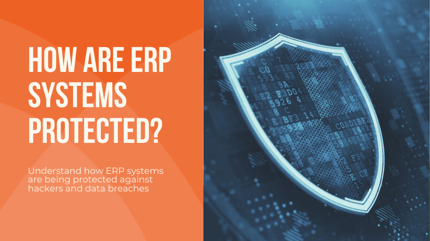
ERP (enterprise resource planning) systems have evolved significantly in recent years. Modern systems now automate practically all day-to-day business processes, including human resources, sales, and stock management. The advantage of all-in-one solutions like ERP systems is that they remove the need for multiple software applications to ensure all aspects of daily operations are accessible. However, this also opens them up to cybersecurity vulnerabilities.
Since ERP systems are interconnected, hackers can gain access to critical data from various business departments. This data includes but is not limited to company financials, manufacturing blueprints, and private customer information. Luckily, there are many best practices your business can implement to protect your ERP against cyber attacks.
ERP System Security Best Practices
Install Software Updates
It’s reported that 87% of business computers feature outdated software, including ERP systems which are not up-to-date. 66% of those companies admit to not running the most current version of their ERP system. Keeping your ERP system up to date is crucial for your security.
Regularly installing updates introduces new features to your software, but primarily addresses weaknesses that have been identified in the software. The world of cybercrime is changing constantly, and hackers are finding ways to get around even the latest of measures. That’s why installing updates as soon as possible is vital to security.
Regularly Train Employees
The biggest vulnerability with your system can come from not properly training your employees on new software. It’s essential to train all your employees about new systems at the start of implementation. However, it is even more important to continually train your employees as the system upgrades and becomes better integrated in their daily work lives. Employees should be briefed about ERP changes regularly to ensure they have a proper understanding of the system and are able to leverage all updates to their full capacity.
Recommendations To Keep Your System Secure
- Set up regular password changes for your staff.
- Create policies to avoid using personal devices in the working hours.
- Review user rights and permissions regularly to ensure that company data is protected and only available for selective staff access.
Strong Password Policies
A strong password is one of the best defenses against unauthorized access. Studies have found that 26% of the time cyber-attacks occur because of poor password policies. One of the most common instances of poor password policies is using system default passwords that are easy for hackers to guess.
Recommendations To Keep Your System Secure
- Use a combination of letters (capitalized and lowercase), numbers, and symbols
- Update passwords regularly
- Create a unique password for every application
- Implement two-factor authentication
- Utilize password management software to generate and store passwords
Stop Using Unauthorized Systems
The purpose of ERP integration is to remove the need for “Frankensteining”. Frankensteining is when multiple software programs are used concurrently to achieve a single goal, such as storing sales data on an ERP, but running reports on Microsoft Excel. Using this method exposes your information to numerous cyber hackers. Data could be easily accessed from many different platforms, especially those that are not adequately protected or updated.To remedy this, you may need to upgrade your ERP system to support your day to day back-office operations.
Two-Factor Authentication
As ERP systems have evolved, they’ve become capable of handling not only a much wider range of information but also more sensitive information as well. One-factor authentication allows hackers to easily crack passwords. Two-factor authentication can come in many forms.
- Security questions.
- Verification through another device or email.
- Biometrics (fingerprint scanning, voice recognition, or face identification).
Cloud ERP Security Advantages
When using software hosted in the cloud, security is managed through the cloud hosting provider. Cloud providers have installed and maintained specialized systems for automated detection of suspicious activity. Any suspected intrusions are immediately analyzed and responded to according to predefined procedures. Additionally, cloud providers create policies and dedicate teams that specialize in cybersecurity to prevent cyber attacks.
Software Updates in the Cloud
The cloud provider offers a number of options for making software updates easier. Many providers automatically install updates during non-peak hours, and others enable updates to be installed in the background so day to day operations remain undisturbed. They are also able to install continual updates to patch any security flaws that are discovered.
Additionally, cloud providers include the cost of updates in your pre-existing cost, unlike an in-house ERP. In-house ERPs will often cost extra to update, tie up your IT staff, and sometimes require additional servers to support the new functions.
Handling Large Scale Attacks
One of the areas where cloud providers have the biggest advantage is in responding to denial of service attacks. A denial of service attack occurs when cyber hackers build an army of coordinated but individually isolated pieces of software that send Internet requests to a single destination. In-house ERPs are vulnerable to cyber-attacks because they are not equipped with built-in security functions.
In contrast, cloud providers maintain distributed and synchronized data centers around the globe that provide a natural defense. It is difficult for cyber hackers to pinpoint exact destinations because signals are being bounced around from different global data centers simultaneously. Additionally, cloud providers maintain dedicated teams and equipment to specifically respond to denial of service attacks quickly and at scale.
A good ERP system can be the difference between business failure and success. ERPs store a business's most valuable information, especially when they are integrated with a CRM or PRM system. It is critical to ensure precious data is protected and regularly maintained. Partnering with a cloud-based ERP system or agency helps ensure your security is taken care of. ManoByte is a trusted NetSuite Cloud ERP Partner. Our trained team is ready to answer any questions that you may have about setting up or upgrading your system.

